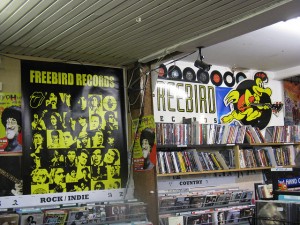
As a music-obsessed teen in the mid-nineties, I would often spend my Saturday afternoons traversing Dublin’s numerous record shops, blackening my thumbs with the dust of a thousand record sleeves.
Even if I didn’t make a purchase, (being a broke music-obsessed teen, this was usually the case), it was never a waste of a day. There was something magical about those stores; especially the smaller, independently owned ones. The stale air, sweat, and cigarette smoke, all mixed with the distinctive scent of vinyl, created a unique atmosphere, one thoroughly enticing to a young music connoisseur.
By the time DVD’s had arrived on the scene, my love of film equalled my musical obsessions. While it was never quite the same experience as record shopping, hunting down my favourite movies on disc brought a lot of enjoyment.
To recreate such an experience in the Dublin of today is almost impossible. The independent outlets have long been run out of town by HMV, who themselves shut down all sixteen of their Irish stores back in February, resulting in the loss of over three hundred jobs. That leaves Tower Recordsí two outlets (Wicklow St. and Easons) as the only major record stores remaining in the city centre. With the video rental store also nearly a thing of the past, those wishing to indulge their love of film and music are increasingly turning to the internet.
The rise of iTunes is commonly cited as the greatest contributor to the death of brick-and-mortar record stores. With almost thirty million songs available, thereís enough content to suit the most demanding consumer. The major advantage the service has over its high street competitors is the ability for customers to purchase on a song-by-song basis. You love one particular track on an otherwise dull album? Just pay for the song you want and ignore the rest.
The biggest criticism of iTunes is that it overwhelmingly favours the biggest artists, thanks to the ëfront-pageí of its online store, where only the most commercially viable acts are featured. In a traditional record store, one can browse and discover new artists. iTunes removes this randomness; if you donít already know the name of the artist you’re looking for, you can’t search for it. This puts smaller acts at a huge disadvantage and leads to a monopolising of the charts by the bigger acts. Twenty years ago it was rare for an artist to have two tunes in the top twenty at once. Now, artists like Rihanna and Beyonce can take up half the slots on a chart by themselves.
Of course, the web gives independent artists a means of distribution without having to rely on a record label. Without the backing of a label, however, these artists wonít find themselves being promoted on iTunes, instead they’ll find themselves relying heavily on word of mouth.
Every now and then we hear of an ‘internet sensation’ being discovered on YouTube but, with sixty hours of video uploaded to the site every minute, these ‘discoveries’ are one in a billion.
Conversely, independent film-makers have fared much better in the digital age. Netflix has become such a force in the U.S that video rental stores have practically become a thing of the past State-side. For the price of one DVD rental from a high street store, you can view as many movies online as you have time for.
 With Netflix desperate for content, independent film-makers have benefitted greatly. A low-budget drama can sit beside the latest Hollywood blockbuster on the menu screen; a far more democratic process than the big-name monopolisation of iTunes.
With Netflix desperate for content, independent film-makers have benefitted greatly. A low-budget drama can sit beside the latest Hollywood blockbuster on the menu screen; a far more democratic process than the big-name monopolisation of iTunes.
T.V series are hugely popular among Netflix subscribers, with the ability to watch a full season in one sitting if you so desire. Netflix have even begun to produce their own material, starting with ‘House of Cards’, a Kevin Spacey starring series whose thirteen episodes were all made available instantly.
These new ways of consuming our favourite media may be convenient but, if you ask me, nothing beats the fun of flicking through a dusty rack of records in a damp, dingy basement.
By Eric Hillis



